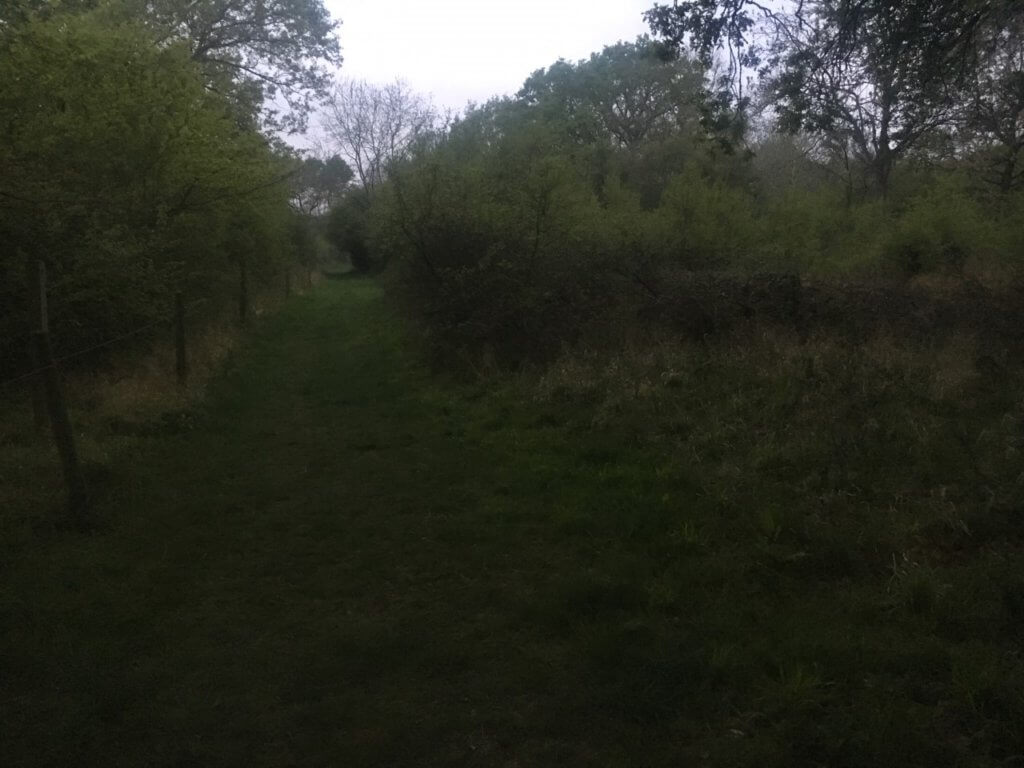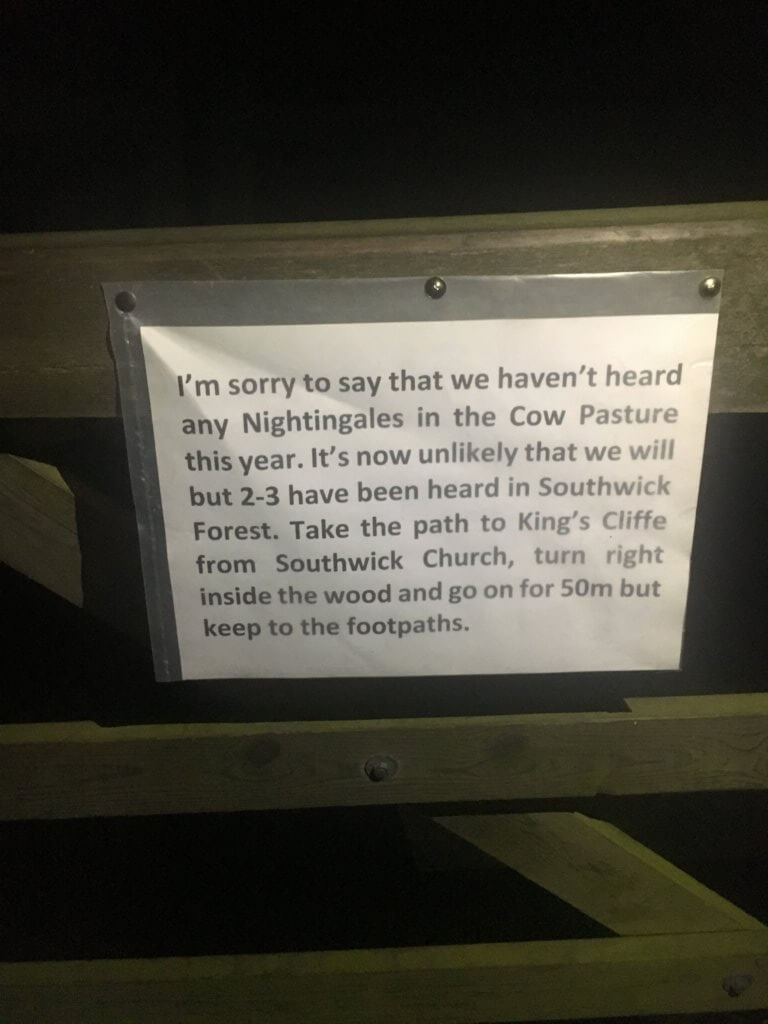
Encouraged by reading on Twitter that after missing a year, last year, Nightingales returned to a local wood, I set out to listen again for Nightingales at Glapthorn Cow Pasture yesterday evening.
The first blog post I wrote, for the RSPB on 11 May 2009, was about Nightingales in Glapthorn Cow Pasture. I wrote then that the Nightingales ‘never disappoint’. When I wrote that short blog 10 years ago I had already been going to Glapthorn almost every year for many years to check in with Nightingales, and I’ve done it almost every year since.
Nightingales in the gloom, amongst the trees and scrub of that Wildlife Trust reserve have been a regular and an important part of my life. Not just ‘getting Nightingale for the year’ but a rendezvous with nature that showed that the world was still turning in the right way despite the highs and lows of human existence – at least nature was reliable. Reliable and utterly wonderful.
‘Utterly’ is the right word of course as Nightingales ‘singest of summer in full-throated ease‘.
But last year the Nightingales didn’t return to Glapthorn. I went several times to look and listen but they weren’t there.

But you mustn’t give up hope if you are nature conservationist and so I went back to Glapthorn in late April and again yesterday evening – but no Nightingales.
I don’t think I can properly express how sad this makes me. Nightingales, and Nightingales at Glapthorn, have been a point in the year which have always sent me away happier, more contented, and more relaxed. The song is beautiful and uplifting, but the fact that this hidden bird has come back from Africa to sing in this woodland, as have generations of Nightingales before, and that I was hearing that song again, as I had with my father (who passed away more than two decades ago), with my mother (still with us), with Rosemary, with our children as youngsters, teenagers and now as rather wonderful twenty-somethings has meant so much to me. It looks like the chain has been broken – the wood has lost the sound that made it so special to me and to us as a family. I may never take future grandchildren to Glapthorn and they will never talk to their kids of listening to the Nightingales with their grandparents.
[registration_form]
Utterly heart breaking Mark. I’ve never heard a Nightingale in the flesh, or should I say ‘feathers’ – I reside a bit too far North. I”d always promised myself a night or two in their habitat, I hope I’m not too late. As you say, there’s always hope. Keep up the fab Blog,
When Richard and I first got together in the 1980s he took me to hear nightingales locally at a very reliable spot. We didn’t hear one and it’s many years since one was heard in the whole county.
As a child I could hear nightingales from my bedroom window. As a young birder I enjoyed them at Fingringhoe Wick N.R. in Essex. Now I live too far north and haven’t heard one for several decades. I mourn that loss, my wife has never heard that sound, felt that experience.
Very sad. I don’t know what the deer situation is in GCP but one cause of the nightingale decline in East Anglia is too many deer – Chas Holt’s study in Bradfield Woods (Ibis 2010) demonstrated the shocking effect of over-browsing on the density of territories and where the birds spent their time.
Alas, we can’t have wolves or lynx in these woods, so deer control is surely a moral no-brainer. How you educate the general public to that view in the present climate of opinion, I don’t really know.
Thirty years ago when I lived in Thrapston, I would lay in bed and listen to the Nightingales singing along the disussed railway line that ran beside the gravel pit. On one memorable morning I counted 7 males singing as I walked by and had a bird nest building by my feet as I stood listening. Sadly when I returned a few years ago the habitat had been destroyed and no birds to be seen or heard. Two other sites that I could rely on have sadly fallen silent too.
Mark, people say you can’t miss something that you have never had. Well anyone reading your post on this will surely want to hear one if they have never done so.
Another thing that we have taken from future generations.
Have never had the privilege of hearing a Nightingale ‘live’, and likely never will. But I can understand a little how you feel. I miss hearing the Turtle Dove locally, even though I’d only recorded it for a few years, now lost due partly to intentional habitat change, ready for development. Listening to recordings just isn’t the same, is it?
I feel the same way about the spotted flycatchers that reliably nested in my parents garden for many years but now no longer come.
I’ve been working in a factory in the north of England atm and every day I pass a patch of grass with an oyster catcher nesting on it – so that is cheering me up
Very sad news. This was the first place I ever heard a Nightingale.
Interesting article in the Guardian on April 19th about Nightingales in Berlin of all places! Well worth a read.
Daniel – yes, I saw that too. I may check them out later this year.
Mark, for me this raised the question of what is going wrong in the UK and how is the German population doing in their general countryside.
I’m hoping the weather brightens up this weekend so that I can have a listen at my local wood.
I do wonder if a lack of management of woodland for coppicing is partly responsible for the decline of the nightingale as well as dormice and some woodland butterflies. Maybe coppicing coupled with some for of deer management, lethal or non lethal helps promote the undergrowth in which they thrive.